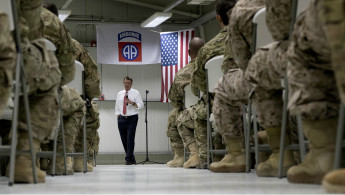US mobilisation in Anbar 'confuses' Islamic State group
The US Army build-up in Anbar province is "confusing" the Islamic State group, freezing its activities on the ground and forcing it to change its strategies in the province, according to officials, security experts and tribal sources.
"The [IS] organisation today suffers from a great confusion in its ranks with the looming battle of Anbar and after US arms and ground troops have reached the province," Anbar Provincial Council member Mohammad Farhan told al-Araby al-Jadeed.
"[IS] has frozen all of its activities on the ground across the province, apart from some simple and useless attacks it carries out here and there, to try to demonstrate its presence in the province and that it doesn't fear the [impending] battle," he added.
Farhan underscored that "most of the organisation's leaders have been only busy during this period with fortification work and the formation of defence lines, as well as seeking to take their families out of the province for their security.
"The preparations have today achieved a moral victory over [IS] that will contribute to decisively concluding the battle on the ground with minimal losses."
Farhan said that the people of Anbar under IS control are noticing a significant change in IS strategy, "as well as a change in their treatment of citizens; trying to earn their affability".
"All of this points to a big split in the morale of the organisation."
| Today [IS] lives in horror and knows that it is fighting a losing battle in Anbar - Anbar tribal leader Sheikh Abdul Rahman al-Muhammadi |
Sheikh Abdul Rahman al-Muhammadi, an Anbar tribal leader, said IS was losing support in teh province.
"Today [IS] lives in horror and knows that it is fighting a losing battle in Anbar," he said.
"The organisation has proven its presence and strength through its battles with the Popular Mobilisation militias... and was able to defeat them and force them to withdraw, and it knows very well the capabilities of the tribes - who fight to the death for the sake of their children and women - and that the tribal experience, which overwhelmed al-Qaeda in 2007 and which resisted [IS] for a year and a half is still there in [IS] memory."
Ahmad al-Saidi, a security expert, said that "the battle of Anbar today only requires the intensification of airstrikes on [IS] strongholds".
He argued that a concentration of air raids in Anbar would lead to the "complete collapse of the organisation's morale and would exhaust its strength and decide the outcome of the battle".
Saidi predicted that IS would "pull out its forces from the province, in the event the build-up continues and [its] broken condition continues".
Military and local Iraqi sources had previously told al-Araby about a US military build-up in preparation for a battle to liberate Ramadi, giving tribes a major role in the attack - after the failure of the Iraqi army and the Popular Mobilisation militia to retake Anbar.



